牛津译林版(2019)必修 第三册Unit 2 Natural disasters reading 课件(共35张PPT)
文档属性
| 名称 | 牛津译林版(2019)必修 第三册Unit 2 Natural disasters reading 课件(共35张PPT) | 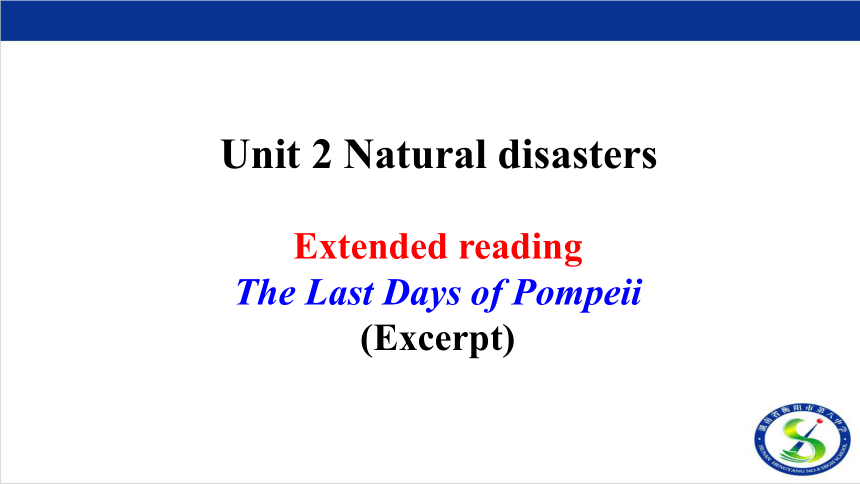 | |
| 格式 | pptx | ||
| 文件大小 | 25.1MB | ||
| 资源类型 | 教案 | ||
| 版本资源 | 牛津译林版(2019) | ||
| 科目 | 英语 | ||
| 更新时间 | 2023-07-14 07:40:41 | ||
图片预览

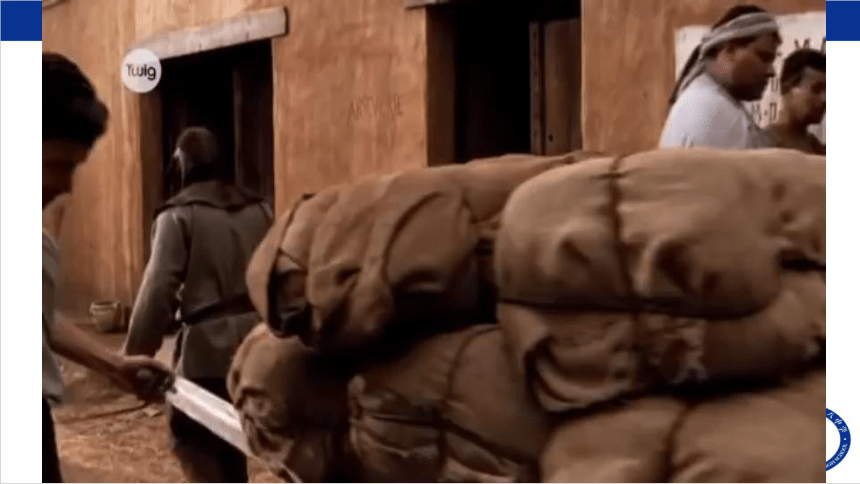
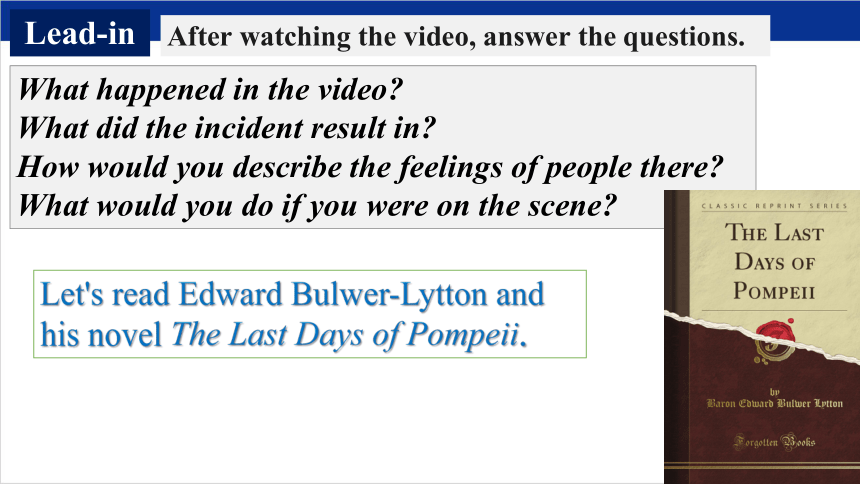
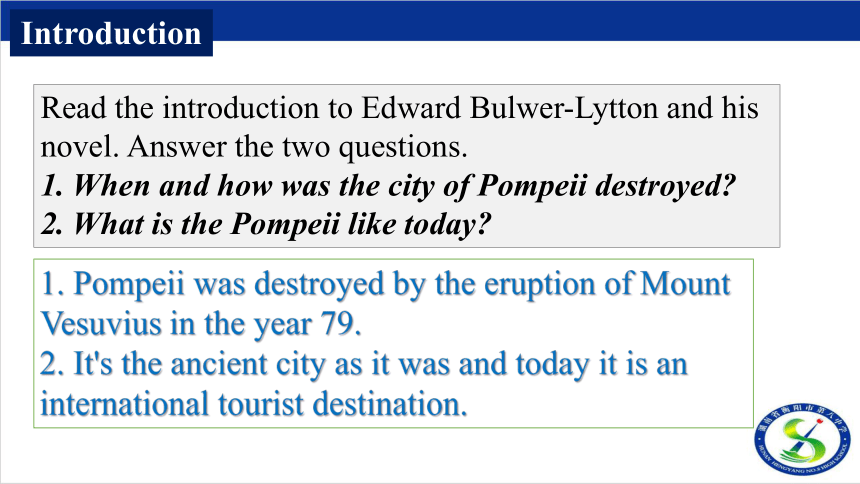
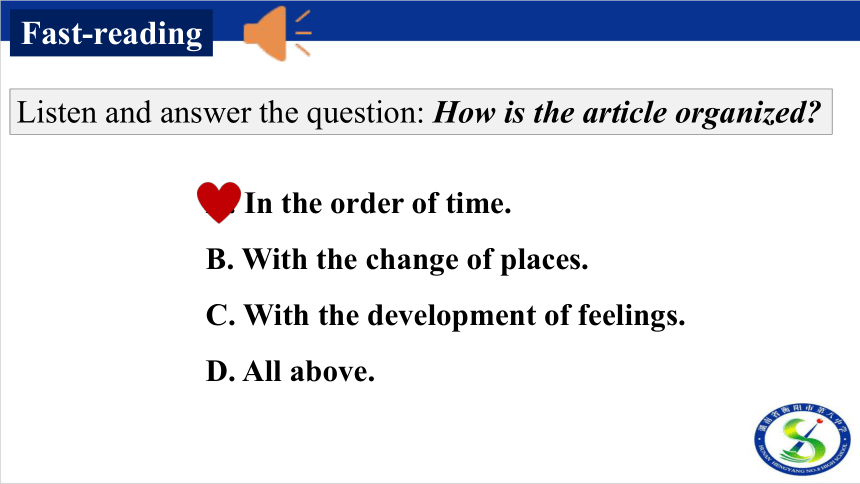
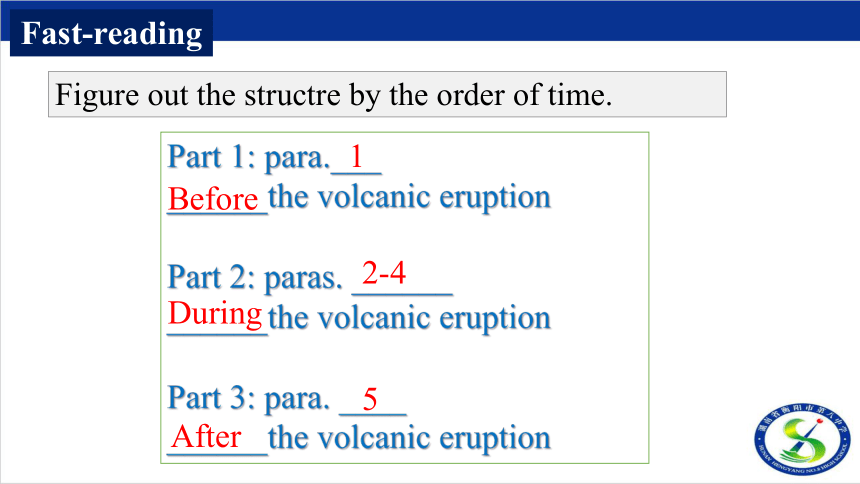
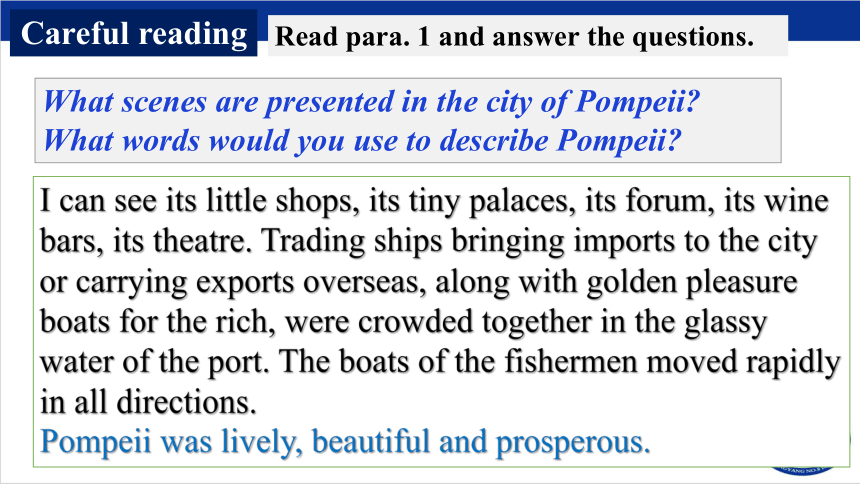
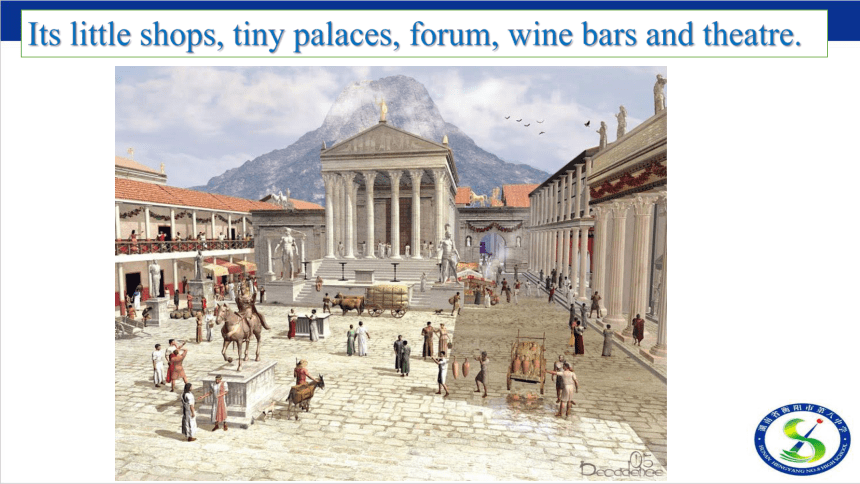
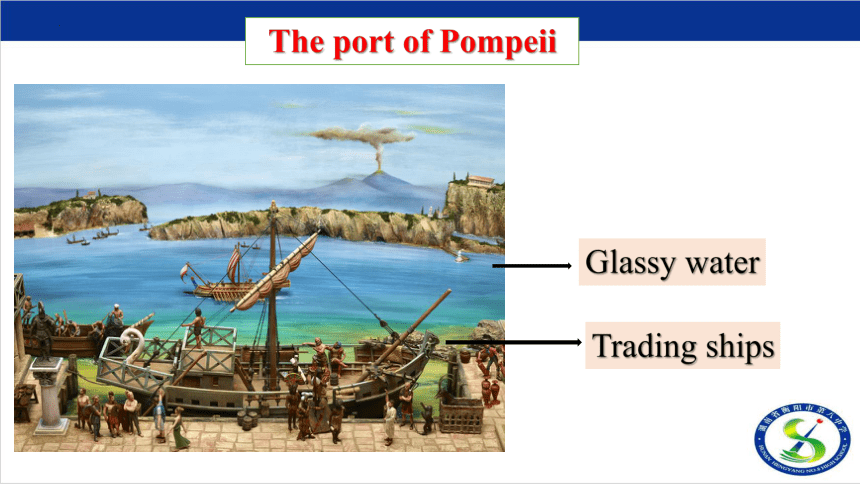
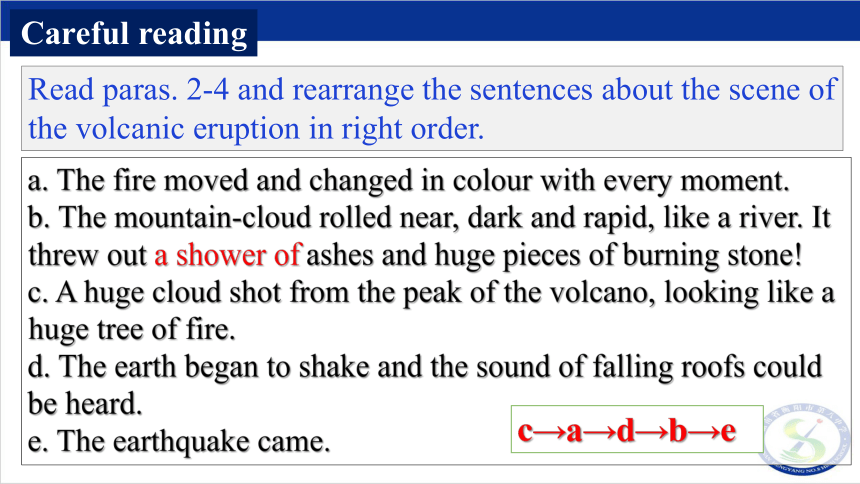
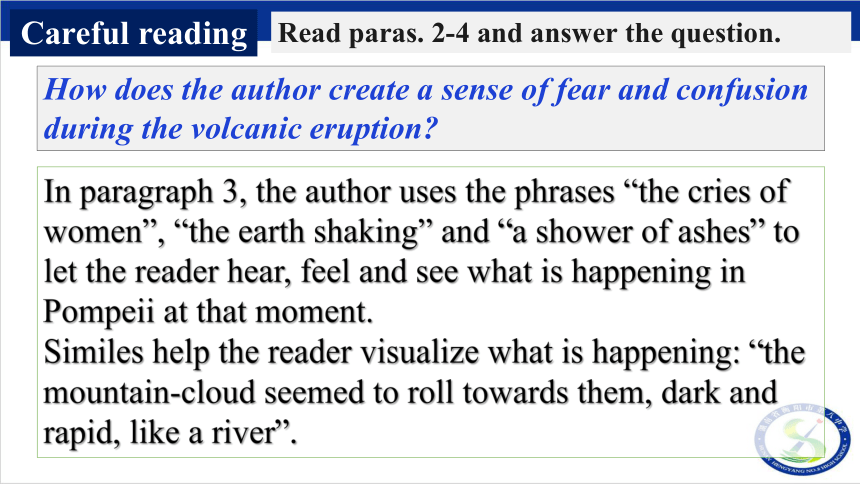
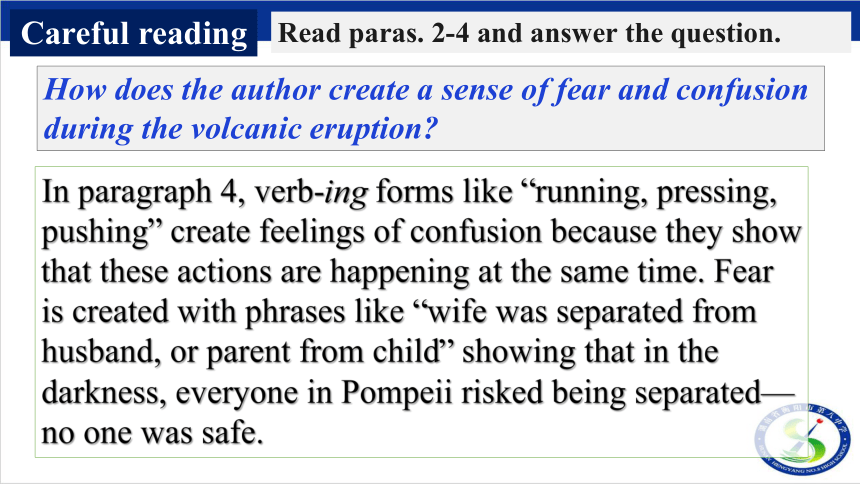
文档简介
(共35张PPT)
Extended reading
The Last Days of Pompeii
(Excerpt)
Unit 2 Natural disasters
Let's read Edward Bulwer-Lytton and his novel The Last Days of Pompeii.
Lead-in
What happened in the video
What did the incident result in
How would you describe the feelings of people there
What would you do if you were on the scene
After watching the video, answer the questions.
1. Pompeii was destroyed by the eruption of Mount Vesuvius in the year 79.
2. It's the ancient city as it was and today it is an international tourist destination.
Introduction
Read the introduction to Edward Bulwer-Lytton and his novel. Answer the two questions.
1. When and how was the city of Pompeii destroyed
2. What is the Pompeii like today
In the order of time.
With the change of places.
With the development of feelings.
All above.
Fast-reading
Listen and answer the question: How is the article organized
Fast-reading
Part 1: para.___
______the volcanic eruption
Part 2: paras. ______
______the volcanic eruption
Part 3: para. ____
______the volcanic eruption
Before
During
After
Figure out the structre by the order of time.
1
2-4
5
Careful reading
I can see its little shops, its tiny palaces, its forum, its wine bars, its theatre. Trading ships bringing imports to the city or carrying exports overseas, along with golden pleasure boats for the rich, were crowded together in the glassy water of the port. The boats of the fishermen moved rapidly in all directions.
Pompeii was lively, beautiful and prosperous.
What scenes are presented in the city of Pompeii
What words would you use to describe Pompeii
Read para. 1 and answer the questions.
Its little shops, tiny palaces, forum, wine bars and theatre.
The port of Pompeii
Trading ships
Glassy water
Careful reading
a. The fire moved and changed in colour with every moment.
b. The mountain-cloud rolled near, dark and rapid, like a river. It threw out a shower of ashes and huge pieces of burning stone!
c. A huge cloud shot from the peak of the volcano, looking like a huge tree of fire.
d. The earth began to shake and the sound of falling roofs could be heard.
e. The earthquake came.
c→a→d→b→e
Read paras. 2-4 and rearrange the sentences about the scene of the volcanic eruption in right order.
Careful reading
In paragraph 3, the author uses the phrases “the cries of women”, “the earth shaking” and “a shower of ashes” to let the reader hear, feel and see what is happening in Pompeii at that moment.
Similes help the reader visualize what is happening: “the mountain-cloud seemed to roll towards them, dark and rapid, like a river”.
Read paras. 2-4 and answer the question.
How does the author create a sense of fear and confusion during the volcanic eruption
Careful reading
In paragraph 4, verb-ing forms like “running, pressing, pushing” create feelings of confusion because they show that these actions are happening at the same time. Fear is created with phrases like “wife was separated from husband, or parent from child” showing that in the darkness, everyone in Pompeii risked being separated—no one was safe.
Read paras. 2-4 and answer the question.
How does the author create a sense of fear and confusion during the volcanic eruption
Careful reading
Its walls were fresh as if painted yesterday; not a single colour changed on the rich pattern of its floors. In its forum, the half-finished columns seemed as if just left by the workman's hand.
What was the city like after it was unearthed
Read para. 5 and answer the question.
Walls
Columns
Thinking
Compare the first and last paragraph. What effect do they create What does the author want to remind us
They create a strong comparison between Pompeii's lively past and lifeless present. By doing so, the author wants to remind us that in the flowing river of time, human's life is just a ripple and in the face of Mother Nature's power, human beings are small and weak.
Discussion
People in Pompeii were not aware of the signs before the volcano erupted, and the city was destroyed. Do you think that we will be better able to protect ourselves from natural disaters in the future Why or why not
Option 1
Yes, I believe we will be better able to protect ourselves from natural disasters in the future. The development of science and technology will improve the ability to predict the arrival of natural disasters and help us be better organized and prepared for disasters.
Option 2
No. No matter how advanced science and technology may be in the future, natural disasters will always challenge us because most of them are unpredictable. Human technical skill will never match the power of nature so our ability to protect ourselves will always be limited and this means that we will always be victims of natural disasters in some way.
Language Points
1. ... a talented writer who left his mark on the English language. (Lines1-2)
mark n.
①They followed the marks that the tyres _________ on the road.
②He ________________________________ (得高分) in the examinations.
③He __________ (击中/没有击中) the mark.
left/made
got/received/gained/earned high marks
hit/missed
给....留下持久的印象
目标;靶子
痕迹
mark v.做记号;留下痕迹; 标明方位; 纪念;表明;打分;
钉人防守;
①Prices __________ (mark) on the goods.
②The surfaces are made from a material that _________ (not mark).
③The route has been marked ___ red.
④The agreement ________________ (标志新时代)in international relations.
⑤I spend at least six hours a week ________. (mark)
⑥Our defender had him closely marked.
are marked
doesn't mark
in
marks a new era
marking
“盯人”
“打分”
Correction
Marking with his name, the bag will be found soon.
Marked
2. Trading ships bringing imports to the city or carrying exports overseas, along with golden pleasure boats for the rich, were crowded ... (Lines 9-11)
imports & exports 进口 / 出口
带im/in前缀的单词往往有“向内”的意思,而ex-前缀则相反
如:include & exclude (包含 / 排斥,排除)
implicit & explicit (含蓄的,暗示的/直率的,明确的)
impose & expose (强加,征税/ 揭露,暴露在外)
internal & external (内部的/ 外部的,表面的)
along with 连同;随着;以及;和……一起;除……以外(还)
eg. So long as what you do is right, I'll go along with you.
当together with连接前后两个主语时,谓语应该根据前面主语的人称和数来决定,此类短语还有but、except、besides、including、like、with、as well as、as much as、 no less than、along with、in addition to、combined with、rather than等。
Have a try
①John, rather than his roommates, ______ to blame.
②My father, no less than I, _______ a baseball fan.
no less than 不亚于
③Two children with their mother _______ come.
is
is
have
3. It took the form of a huge tree ... (Lines 19-20)
take the form of 表现为……的形式
in forms of 以……的形式
take form 具有一定形式,成形
in form 在形式上
Then the shadowy outline did ___________.
Literature is the expression of life ___________ truth and beauty.
Our next class will ________________ a debate.
His essays are fixed _____________.
take form
in forms of
take the form of
in form
4. ... it threw out a shower of ashes and huge pieces of burning stones ... (Lines 24-25)
throw out 扔掉,扔出
throw up 呕吐
throw away 扔掉,丢弃
throw light on 阐明……,照亮,使……显得清楚
This problem is hard enough to throw the teacher.
We are ready to throw a party.
难住老师
举办晚会
使心烦意乱;使困惑;
使惊奇
5. Its walls were fresh as if painted yesterday ... (Line 34)
... the half-finished columns seemed as if just left by the workman's hand (Lines 36-37)
as if =as though “好像”,可在look, seem等系动词后引导表语从句。
He looked as if / though he was ill.
It seems as if it is going to rain.
它还可引导方式状语从句。如:
I remember the whole thing as if / though it happened yesterday.
①当说话者认为句子所述的是真实的或极有可能发生或存在的事实时,as if从句用陈述语气。如:
He talks as if he is drunk.
②当说话人认为句子所述的是不真实的或极少有可能发生或存在的情况时,as if从句用虚拟语气。
表示与现在事实相反,谓语动词用一般过去式。如:
You look as if you _______________ (not care).
He talks as if he ________ (know) what had happened.
It looks as if it ________ (may) snow.
didn't care
knew
might
表示与过去或与谈话时间为止发生的事实相反,谓语动词用“had +过去分词”。如:
He talked about the Great Wall as if he ___________(be) there before.
The girl listened as if she ________________ (turn) to stone.
表示与将来事实相反,谓语动词用“would / could / might + 动词原形”。如:
He is ready to open his mouth as if he ____________ (say) something.
had been
had been turned
might say
as if从句中的省略
如果as if 引导的从句是“主语+系动词”结构,可省略主语和系动词等成份,这样as if 后就只剩下名词、不定式、形容词(短语)或动词-ing形式等。
He acts as if he was a fool.
He paused as if he was going to let the sad memory pass.
The girl left the room hurriedly as if she was angry.
From time to time, Jason turned round as if he was searching for someone.
A
1. power
2. crash
3. odd
4. conference
5. exit
6. destination
7. injured
8. shock
B
1. far and wide
2. To my relief
3. ran out of
4. in case
5. kept his head
6. took the form of
7. safe and sound
8. in the distance
D
1. destrctive
2. slight
3. reaction
4. of
5. while/but
6. (was ) flooded
7. anxiously
8. deaths
寒假作业
《高中寒假》
续写: 选择四篇自己完成,其余的至少抄写一遍范文;
应用文: P7+P46可不写
另外:
1. 自学必修三第三四单元单词,复习必修三的一二单元单词,开学检测必修三;
2. 大学四级词汇完成一半
3. 读完原版《小王子》或者另外的原著
Extended reading
The Last Days of Pompeii
(Excerpt)
Unit 2 Natural disasters
Let's read Edward Bulwer-Lytton and his novel The Last Days of Pompeii.
Lead-in
What happened in the video
What did the incident result in
How would you describe the feelings of people there
What would you do if you were on the scene
After watching the video, answer the questions.
1. Pompeii was destroyed by the eruption of Mount Vesuvius in the year 79.
2. It's the ancient city as it was and today it is an international tourist destination.
Introduction
Read the introduction to Edward Bulwer-Lytton and his novel. Answer the two questions.
1. When and how was the city of Pompeii destroyed
2. What is the Pompeii like today
In the order of time.
With the change of places.
With the development of feelings.
All above.
Fast-reading
Listen and answer the question: How is the article organized
Fast-reading
Part 1: para.___
______the volcanic eruption
Part 2: paras. ______
______the volcanic eruption
Part 3: para. ____
______the volcanic eruption
Before
During
After
Figure out the structre by the order of time.
1
2-4
5
Careful reading
I can see its little shops, its tiny palaces, its forum, its wine bars, its theatre. Trading ships bringing imports to the city or carrying exports overseas, along with golden pleasure boats for the rich, were crowded together in the glassy water of the port. The boats of the fishermen moved rapidly in all directions.
Pompeii was lively, beautiful and prosperous.
What scenes are presented in the city of Pompeii
What words would you use to describe Pompeii
Read para. 1 and answer the questions.
Its little shops, tiny palaces, forum, wine bars and theatre.
The port of Pompeii
Trading ships
Glassy water
Careful reading
a. The fire moved and changed in colour with every moment.
b. The mountain-cloud rolled near, dark and rapid, like a river. It threw out a shower of ashes and huge pieces of burning stone!
c. A huge cloud shot from the peak of the volcano, looking like a huge tree of fire.
d. The earth began to shake and the sound of falling roofs could be heard.
e. The earthquake came.
c→a→d→b→e
Read paras. 2-4 and rearrange the sentences about the scene of the volcanic eruption in right order.
Careful reading
In paragraph 3, the author uses the phrases “the cries of women”, “the earth shaking” and “a shower of ashes” to let the reader hear, feel and see what is happening in Pompeii at that moment.
Similes help the reader visualize what is happening: “the mountain-cloud seemed to roll towards them, dark and rapid, like a river”.
Read paras. 2-4 and answer the question.
How does the author create a sense of fear and confusion during the volcanic eruption
Careful reading
In paragraph 4, verb-ing forms like “running, pressing, pushing” create feelings of confusion because they show that these actions are happening at the same time. Fear is created with phrases like “wife was separated from husband, or parent from child” showing that in the darkness, everyone in Pompeii risked being separated—no one was safe.
Read paras. 2-4 and answer the question.
How does the author create a sense of fear and confusion during the volcanic eruption
Careful reading
Its walls were fresh as if painted yesterday; not a single colour changed on the rich pattern of its floors. In its forum, the half-finished columns seemed as if just left by the workman's hand.
What was the city like after it was unearthed
Read para. 5 and answer the question.
Walls
Columns
Thinking
Compare the first and last paragraph. What effect do they create What does the author want to remind us
They create a strong comparison between Pompeii's lively past and lifeless present. By doing so, the author wants to remind us that in the flowing river of time, human's life is just a ripple and in the face of Mother Nature's power, human beings are small and weak.
Discussion
People in Pompeii were not aware of the signs before the volcano erupted, and the city was destroyed. Do you think that we will be better able to protect ourselves from natural disaters in the future Why or why not
Option 1
Yes, I believe we will be better able to protect ourselves from natural disasters in the future. The development of science and technology will improve the ability to predict the arrival of natural disasters and help us be better organized and prepared for disasters.
Option 2
No. No matter how advanced science and technology may be in the future, natural disasters will always challenge us because most of them are unpredictable. Human technical skill will never match the power of nature so our ability to protect ourselves will always be limited and this means that we will always be victims of natural disasters in some way.
Language Points
1. ... a talented writer who left his mark on the English language. (Lines1-2)
mark n.
①They followed the marks that the tyres _________ on the road.
②He ________________________________ (得高分) in the examinations.
③He __________ (击中/没有击中) the mark.
left/made
got/received/gained/earned high marks
hit/missed
给....留下持久的印象
目标;靶子
痕迹
mark v.做记号;留下痕迹; 标明方位; 纪念;表明;打分;
钉人防守;
①Prices __________ (mark) on the goods.
②The surfaces are made from a material that _________ (not mark).
③The route has been marked ___ red.
④The agreement ________________ (标志新时代)in international relations.
⑤I spend at least six hours a week ________. (mark)
⑥Our defender had him closely marked.
are marked
doesn't mark
in
marks a new era
marking
“盯人”
“打分”
Correction
Marking with his name, the bag will be found soon.
Marked
2. Trading ships bringing imports to the city or carrying exports overseas, along with golden pleasure boats for the rich, were crowded ... (Lines 9-11)
imports & exports 进口 / 出口
带im/in前缀的单词往往有“向内”的意思,而ex-前缀则相反
如:include & exclude (包含 / 排斥,排除)
implicit & explicit (含蓄的,暗示的/直率的,明确的)
impose & expose (强加,征税/ 揭露,暴露在外)
internal & external (内部的/ 外部的,表面的)
along with 连同;随着;以及;和……一起;除……以外(还)
eg. So long as what you do is right, I'll go along with you.
当together with连接前后两个主语时,谓语应该根据前面主语的人称和数来决定,此类短语还有but、except、besides、including、like、with、as well as、as much as、 no less than、along with、in addition to、combined with、rather than等。
Have a try
①John, rather than his roommates, ______ to blame.
②My father, no less than I, _______ a baseball fan.
no less than 不亚于
③Two children with their mother _______ come.
is
is
have
3. It took the form of a huge tree ... (Lines 19-20)
take the form of 表现为……的形式
in forms of 以……的形式
take form 具有一定形式,成形
in form 在形式上
Then the shadowy outline did ___________.
Literature is the expression of life ___________ truth and beauty.
Our next class will ________________ a debate.
His essays are fixed _____________.
take form
in forms of
take the form of
in form
4. ... it threw out a shower of ashes and huge pieces of burning stones ... (Lines 24-25)
throw out 扔掉,扔出
throw up 呕吐
throw away 扔掉,丢弃
throw light on 阐明……,照亮,使……显得清楚
This problem is hard enough to throw the teacher.
We are ready to throw a party.
难住老师
举办晚会
使心烦意乱;使困惑;
使惊奇
5. Its walls were fresh as if painted yesterday ... (Line 34)
... the half-finished columns seemed as if just left by the workman's hand (Lines 36-37)
as if =as though “好像”,可在look, seem等系动词后引导表语从句。
He looked as if / though he was ill.
It seems as if it is going to rain.
它还可引导方式状语从句。如:
I remember the whole thing as if / though it happened yesterday.
①当说话者认为句子所述的是真实的或极有可能发生或存在的事实时,as if从句用陈述语气。如:
He talks as if he is drunk.
②当说话人认为句子所述的是不真实的或极少有可能发生或存在的情况时,as if从句用虚拟语气。
表示与现在事实相反,谓语动词用一般过去式。如:
You look as if you _______________ (not care).
He talks as if he ________ (know) what had happened.
It looks as if it ________ (may) snow.
didn't care
knew
might
表示与过去或与谈话时间为止发生的事实相反,谓语动词用“had +过去分词”。如:
He talked about the Great Wall as if he ___________(be) there before.
The girl listened as if she ________________ (turn) to stone.
表示与将来事实相反,谓语动词用“would / could / might + 动词原形”。如:
He is ready to open his mouth as if he ____________ (say) something.
had been
had been turned
might say
as if从句中的省略
如果as if 引导的从句是“主语+系动词”结构,可省略主语和系动词等成份,这样as if 后就只剩下名词、不定式、形容词(短语)或动词-ing形式等。
He acts as if he was a fool.
He paused as if he was going to let the sad memory pass.
The girl left the room hurriedly as if she was angry.
From time to time, Jason turned round as if he was searching for someone.
A
1. power
2. crash
3. odd
4. conference
5. exit
6. destination
7. injured
8. shock
B
1. far and wide
2. To my relief
3. ran out of
4. in case
5. kept his head
6. took the form of
7. safe and sound
8. in the distance
D
1. destrctive
2. slight
3. reaction
4. of
5. while/but
6. (was ) flooded
7. anxiously
8. deaths
寒假作业
《高中寒假》
续写: 选择四篇自己完成,其余的至少抄写一遍范文;
应用文: P7+P46可不写
另外:
1. 自学必修三第三四单元单词,复习必修三的一二单元单词,开学检测必修三;
2. 大学四级词汇完成一半
3. 读完原版《小王子》或者另外的原著
同课章节目录
- Unit 1 Nature in the balance
- Welcome to the unit
- Reading
- Grammar and usage
- Integrated skills
- Extended reading
- Project
- Unit 2 Natural disasters
- Welcome to the unit
- Reading
- Grammar and usage
- Integrated skills
- Extended reading
- Project
- Unit 3 The world online
- Welcome to the unit
- Reading
- Grammar and usage
- Integrated skills
- Extended reading
- Project
- Unit 4 Scientists who changed the world
- Welcome to the unit
- Reading
- Grammar and usage
- Integrated skills
- Extended reading
- Project
